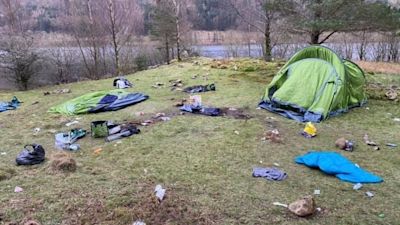Campers leave behind tents, empty bottles and sleeping bags near Thirlmere

As coronavirus restrictions are relaxed in England, there are concerns about the potential impact of an influx of visitors to the Lake District.
A video, viewed by thousands of people on social media, shows tents and litter left behind by campers who stayed overnight in Thirlmere over the weekend.
The Lakes Plastic Collective shared the footage online, describing the mess as "one of the worst fly camp sites" they had ever seen.
Around 13 bin bags of rubbish were collected. They say there was evidence of 'drug use, glass bottles, food and discarded broken camping equipment.'
The National Park Authority says it is working with Cumbria Police, Merseyside Police, and other organisations to tackle anti-social behaviour in the Lake District.
From today, groups of up to six, or two households, can socialise in parks and gardens once more in England. As well as this, outdoor sports facilities have reopened and the 'stay-at-home' order has ended.
Overnight stays are still banned in today's easing of lockdown restrictions.
A new slogan was unveiled to stress the importance of ventilation in reducing the spread of the virus: “Hands, Face, Space and Fresh Air.”
The Lake District National Park is urging people to continue to follow government guidance by minimising travel where possible until 17 May.
Chief Executive, Richard Leafe said: “Our message is whether coming for the first or 50th time, is: plan ahead, try to discover somewhere that’s new to you and enjoy your time here, but please leave no trace.
“By working together and planning ahead for the return of more people coming to the county, we’re equipped for managing potential challenges while ensuring a warm welcome to new and returning visitors.
“This includes creating area-specific action plans to help manage issues experienced during summer 2020 such as local parking issues, fly-camping and anti-social activities.
"Our proactive approach ensures we can respond to the latest challenges and support communities, visitors, businesses and our vital local healthcare services.”